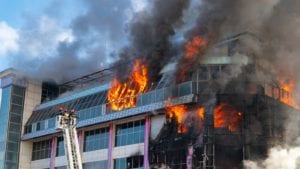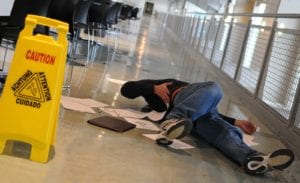COVID-19 presents unique and challenging issues for businesses. Learn about the types of related insurance claims and how carriers might handle your claim.
In 2020, the COVID-19 pandemic became the biggest public health crisis in a generation. Its impact has been profound. Millions lost their jobs. Small businesses all over the country struggle to make ends meet in the aftermath.
The coronavirus caused one of the biggest economic crises of the last century.
As the pandemic became another part of life in the United States, the bills continued to come due. On this subject, one’s thoughts naturally turn to insurance carriers. After all, isn’t this what we pay them for?
Business people, workers, and governments all pay significant amounts toward insurance premiums. This money is supposed to protect against business interruption, liability, and employee injury.
Insurance policies should pay out when there is a legitimate claim. So, now seems like the time to tap those policies. However, insurers don’t always see it that way.
This article will examine the most common types of COVID-19 claims. What are their chances of success? Most importantly, what should you do when dealing with your insurance company?
Business Interruption Insurance

Business interruption insurance coverage is included in many insurance policies. It ensures that, even in the event of a disaster or serious property damage, a business still has income.
After all, the company always needs to pay its employees and manage overhead expenses.
There is a problem with trying to use business interruption coverage for COVID-19 claims. Many insurance carriers will reject these attempts as being outside the coverage of the policy.
Business interruption coverage would apply, for example, if a fire broke out. Let’s say the fire destroyed the building in which the policyholder operated their business. In this case, the policyholder would have a decent business interruption claim.
COVID-19 is different. It may be financially destructive to a business, but it’s not physically destructive. The virus might make a bar inoperable by making its employees sick. It may also force a government-mandated shutdown of all bars. But because of the lack of physical damage to the business, an insurance carrier will likely deny business interruption coverage.
A business owner would be justified in bringing a claim for business interruption in either case. Whether that claim would succeed is an open question.
Massachusetts, New Jersey, and other states are trying to help. They are evaluating statutes to force insurance companies to cover shutdown-related business interruptions. Whether this legislation will pass remains to be seen. In any event, the question of how insurance companies will handle business interruption claims will not go away any time soon.
General Liability Insurance

Commercial general liability insurance policies (also known as CGL policies) protect companies against injury claims arising from the operation of business.
For example, let’s say you are walking through a hotel lobby and slip in a puddle of water. You injure your back and go to the hospital.
Your injury claim would go to the hotel’s insurance company. The carrier would then pay any compensation on the part of the hotel.
If you could not reach a settlement with the insurance company and sued the hotel, the insurance company would still be involved. It would pay to defend the hotel in the lawsuit. It would also pay any settlement or judgment.
In the context of COVID-19, a general liability policy would work the same way. A customer or other person not employed by the business would claim that they were infected by the virus at the business or due to the actions of an employee. That infection would allegedly be a result of the company’s actions or negligence.
For example, a restaurant may face a coronavirus-related claim because a customer saw a server spit in a customer’s food. That would definitely cause a reasonable fear of potential exposure and food-borne infection.
Perhaps an employee was sick with coronavirus and continued to come to work. Customers then find out a week later that they had been in contact with an employee who should have been sent home.
A business faced with one of these kinds of coronavirus claims may be in for a nasty surprise. Many commercial general liability insurance carriers have been denying COVID-related claims. Many policies exclude claims where there has not been an injury or property damage, and infection by the virus does not often produce a clear injury or damage.
Because the insurance company’s coverage position depends on policy language, many businesses may seek all-risk insurance policies, thinking this will provide coverage.
This is not always the case. “All-risk” policies do not have to protect against all risks. They only protect against those that are not expressly excluded. In the case of COVID-19, most carriers will have excluded risks arising from virus exposure. This may vary based on the language of the specific policy.
If you’ve been injured at a business and the business’s insurance company denies your claim, all is not lost. You will simply have to proceed against the business directly rather than the insurance policy. This is not an ideal situation, as most businesses don’t have a great deal of money for lawsuits, but there is still some chance at recovery in this scenario.
Workers’ Compensation Insurance

Workers’ compensation insurance is state-mandated coverage that pays for parts of an employee’s medical treatment and lost wages if they suffer a bodily injury while on the job.
This insurance is important not only to the employee, but the business as well. In most cases, a company that complies with workers’ compensation laws can’t be sued by an employee for injuries or lost wages.
Assuming that the employee can link their COVID-19 issue to the business, getting a claim handled under workers’ compensation coverage should not be too difficult. This sort of claim seems squarely within the bounds of workers’ compensation insurance.
However, if an employee then infects a family member or someone else, workers’ compensation would not apply. In that case, a claim would likely need to be made against the company’s general liability coverage.
When Your Insurer Denies a COVID-19 Claim

Now you have a view of what most commercial insurance policies will and will not cover. The question is now what happens if an insurance carrier makes the wrong decision.
What should you do when a carrier denies your claim but you think they should have approved it? The answer depends on several factors.
First, if you are a business owner making a claim on business interruption insurance, check state law. Your state may be passing a law requiring your carrier to cover certain virus-related claims. This is particularly likely where the interruption was due to a shutdown order.
In any state, consider whether your insurance adjuster has been acting in good faith. If you have a strong basis for your claim that the adjuster refuses to acknowledge, they may be acting in bad faith. In this case, suing your insurance carrier for bad faith claim practices may be the best option.
If you are not a policyholder, a bad faith claim will probably not be available to you. In most states, bad faith claims can only be asserted by policyholders, not third parties. In the event that you need to file a lawsuit, you will have to sue the business itself.
Protect Your Health and Your Livelihood
The COVID-19 pandemic put us all in uncharted territory. Just as it forced many to socialize and work in different ways, it also made some businesses more difficult to run. And at the end of the day, those businesses pay insurance carriers to step in during difficult times.
If you have not had a business interruption thus far, count yourself as lucky. But even so, you should still pull out your commercial insurance policy and take a look at the coverages. Educate yourself on the law in your state. If the worst happens, you will want to know what the likely result is.
And if you or a loved one is infected with COVID-19 as a result of the negligence or misconduct of a business, take action. Consult with a personal injury attorney as soon as possible for a free case evaluation.
How Much is Your Injury Claim Worth?
Find out now with a FREE case review from an attorney…